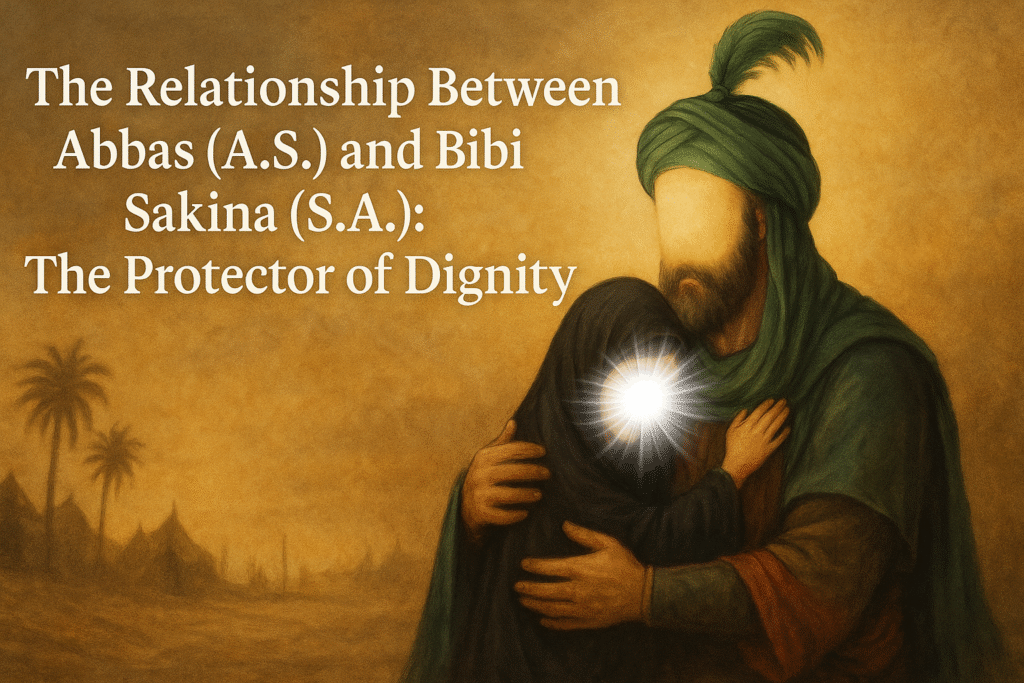Table of Contents
- Introduction
- Who Was Hazrat Abbas (A.S.)?
- Who Was Bibi Sakina (S.A.)?
- The Spiritual Bond Between Abbas (A.S.) and Sakina (S.A.)
- Karbala: The Trial of Loyalty and Love
- The Water Dilemma: Abbas’s Mission for Sakina
- The Protector of Dignity: What Abbas Stood For
- The Martyrdom of Abbas (A.S.)
- How Sakina (S.A.) Mourned Her Uncle
- Lessons for Today’s Believers
- Duas & Ziyarat for Hazrat Abbas and Bibi Sakina
- FAQs
- Conclusion
- References
1. Introduction
The story of Karbala is not just about battle and martyrdom — it’s a tale of divine loyalty, spiritual love, and unwavering protection. Among the most moving aspects of this story is the deep relationship between Hazrat Abbas ibn Ali (A.S.) and Bibi Sakina bint Husayn (S.A.), the youngest daughter of Imam Hussain (A.S.). Their bond reflects the soul of dignity and compassion, especially during the hardships of Ashura.
2. Who Was Hazrat Abbas (A.S.)?
Hazrat Abbas (A.S.), also known as Abu al-Fadl and Qamar Bani Hashim, was the half-brother of Imam Hussain (A.S.) and son of Imam Ali (A.S.) and Ummul Banin (S.A.). Known for his:
- Exceptional loyalty
- Courage and strength
- Deep sense of modesty and respect
He was appointed the standard-bearer of Imam Hussain’s army and was seen as the protector of the camp, especially of the women and children.
3. Who Was Bibi Sakina (S.A.)?
Bibi Sakina (S.A.), also called Ruqqayah, was the beloved daughter of Imam Hussain (A.S.) and Lady Rubab (S.A.). She was:
- Only 4 years old at the time of Karbala
- Gentle, pious, and deeply attached to her father and uncle Abbas
- A symbol of innocence, suffering, and divine patience
Her presence in Karbala makes the tragedy even more heartbreaking.
4. The Spiritual Bond Between Abbas (A.S.) and Sakina (S.A.)
The connection between Abbas (A.S.) and Bibi Sakina (S.A.) went beyond that of uncle and niece. It was:
- A divine trust: Abbas felt spiritually responsible for her well-being
- A bond of honor: He saw protecting her as part of his duty to Allah
- Filled with love and gentleness: He never let her cry if he could help it
According to traditions, whenever Bibi Sakina felt afraid, she would run to Uncle Abbas, knowing his presence meant safety.
5. Karbala: The Trial of Loyalty and Love
As the days passed in Karbala and water ran out, the suffering increased. Children wept from thirst, and Bibi Sakina’s sobs broke the heart of Hazrat Abbas.
Imam Hussain (A.S.) would look at Abbas and say:
“Abbas, even the children are calling your name. Will you bring water for your Sakina?”
At this moment, Abbas (A.S.) was not just a warrior — he became a guardian of dignity and a servant of divine trust.
6. The Water Dilemma: Abbas’s Mission for Sakina
Hazrat Abbas (A.S.) rode toward the Euphrates River with one goal:
To quench the thirst of Bibi Sakina and the other children.
Upon reaching the river, he filled the water bag — but did not drink a single drop, despite extreme thirst. He whispered:
“Ya Nafs, min ba’d al-Husayn hooni — O soul, after Hussain, what worth do you have?”
This self-control, even when water was in his hand, shows how deeply he was committed to the dignity of Ahlul Bayt (A.S.).
7. The Protector of Dignity: What Abbas Stood For
Hazrat Abbas (A.S.) was not just a warrior — he was a shield. He shielded:
- The sanctity of the women of the Prophet’s household
- The honor of the camp of Imam Hussain
- The dignity of little Sakina, whose comfort was his mission
When his arms were severed on the battlefield, he still clutched the water bag in his mouth, aiming to fulfill his promise to Sakina (S.A.).
8. The Martyrdom of Abbas (A.S.)
As arrows pierced his body and he fell to the ground, his only concern was:
“Aqa! Did I manage to bring water for Sakina?”
He called Imam Hussain (A.S.) and said:
“Maula, I am sorry. I could not fulfill my promise to Sakina.”
His martyrdom was so painful that Imam Hussain (A.S.) wept and said:
“Now my back is broken, Abbas.”
9. How Sakina (S.A.) Mourned Her Uncle
When Bibi Sakina learned her uncle Abbas would not return with water:
- She held the empty mashk (water bag) and cried
- She sat silently, no longer asking for water
- That night, she slept on the burning sand, still calling, “Where is my uncle Abbas?”
Later in the ruins of Shaam, Bibi Sakina died in the prison — still carrying the trauma of her uncle’s sacrifice.
10. Lessons for Today’s Believers
This sacred relationship teaches us:
- What true protection means: Abbas was the shield of Islam
- What real dignity is: Even in defeat, Abbas never let the dignity of the Prophet’s household be trampled
- The value of loyalty: To serve someone out of love for Allah is the highest honor
- Respect for women and children: Abbas embodies Islamic ethics of respect and compassion
11. Duas & Ziyarat for Hazrat Abbas and Bibi Sakina
🔹 Dua to Seek Protection through Abbas (A.S.)
اللَّهُمَّ بِحَقِّ أَبِي الْفَضْلِ الْعَبَّاسِ، احْفَظْنِي وَأَطْعِمْنِي مِنْ رِزْقِكَ
Transliteration: Allahumma bi-haqqi Abi al-Fadl al-Abbas, ihfazni wa at’imni min rizqika
Translation: O Allah, for the sake of Abu al-Fadl al-Abbas, protect me and provide for me from Your sustenance.
🔹 Ziyarat Line for Bibi Sakina (S.A.)
“Peace be upon you, O the patient daughter of Hussain. Your tears are our lessons, your silence is our strength.”
12. FAQs
Q1: Was Hazrat Abbas married or had children?
Yes, he had children, but his mission at Karbala was his ultimate sacrifice.
Q2: How old was Bibi Sakina in Karbala?
She was around 4 years old, full of innocence and purity.
Q3: Where is Hazrat Abbas buried?
In Karbala, Iraq, beside the shrine of Imam Hussain (A.S.)
Q4: Is there a shrine for Bibi Sakina?
Yes, her shrine is in Damascus, Syria, where she passed away in captivity.
Q5: Why is Hazrat Abbas called “Bab al-Hawaij”?
Because people believe their prayers are answered through his intercession — he never returned anyone empty-handed.
13. Conclusion
The sacred bond between Hazrat Abbas (A.S.) and Bibi Sakina (S.A.) is one of the most heartbreaking and spiritually uplifting aspects of Karbala. Abbas represents the eternal guardian of dignity, and Sakina is the pure soul he vowed to protect. Their legacy inspires courage, compassion, and unwavering loyalty.
May we learn from their story to protect the innocent, uphold dignity, and stay loyal to truth — no matter the cost.
14. References
- Al-Islam.org
- Nahjul Balagha
- Maqtal al-Husayn (authentic versions)
- Karbala Chronicles by Ayatollah Dastghaib
- Majlis Literature & Shia Historical Texts

